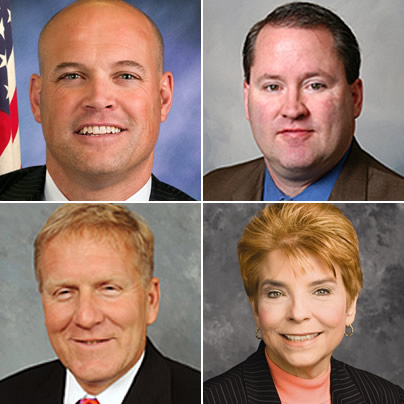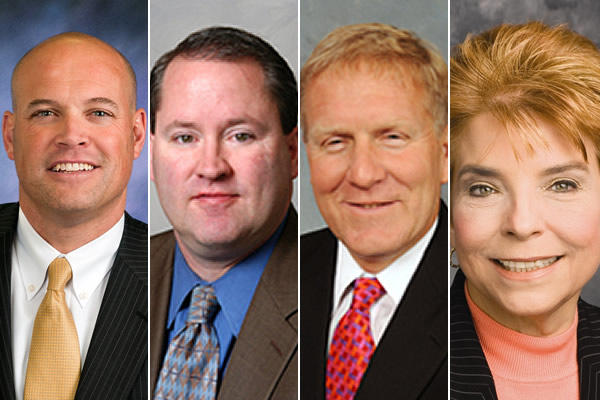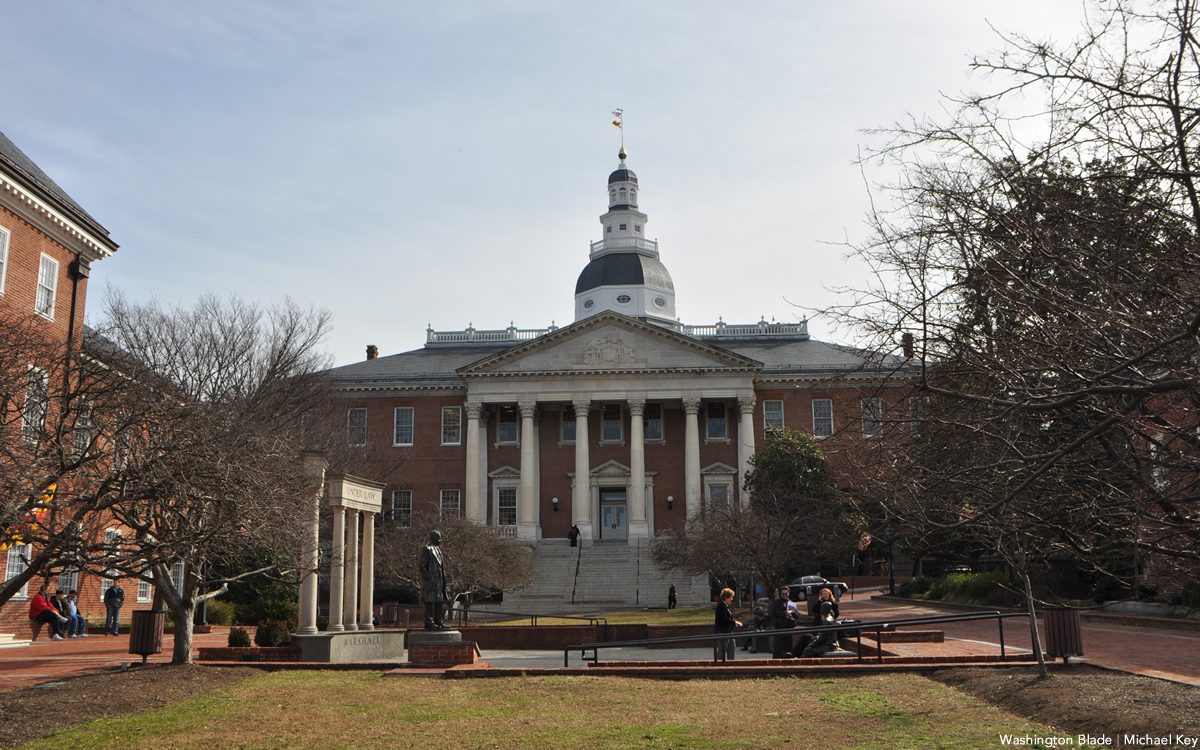News
Ill. Republicans who backed gay nuptials triumph in primaries
LGBT advocates say success demonstrates ‘turning point’ in the GOP


From left, Ill. state Representatives Ron Sandack (R-Bolingbrook), Ed Sullivan, Jr. (R-Libertyville), Tom Cross (R-Plainfield) and Ill. state Comptroller Judy Baar Topinka each won their Republican primaries. (Photos public domain)
Republican officials in Illinois who supported marriage equality won their primaries across the board this week — a development that LGBT rights supporters say demonstrates growing support for marriage equality even within the Republican Party.
Jeff Cook-McCormac, senior adviser to the pro-LGBT American Unity Fund, counted four victories on Tuesday night among Republicans who supported marriage equality and said they represent a “turning point” for the party.
“These victories in Illinois demonstrate that we really are reaching a turning point, not only on the issue nationally, but we’re reaching a turning point within the Republican Party,” Cook-McCormac said. “It’s becoming safer and safer for Republican elected officials to follow their conscience, do the right thing and advance the freedom to marry.”
Each of the three Republicans who voted for marriage equality when it came before the Illinois State House in November — State Reps. Tom Cross, Ed Sullivan and Ron Sandack — faced primary challengers, but came out on top to keep their party’s nomination going into the general election.
Cross and Sullivan beat their competitors by double-digit points in the primary. Sandack scored a narrower win, defeating his opponent by 153 votes.
Additionally, Illinois State Comptroller Judy Baar Topinka, who voiced support for marriage equality, didn’t face a primary challenge. She spoke at rallies in favor of marriage equality, including the ceremony in which Gov. Pat Quinn signed the marriage legislation into law.
Pat Brady, former head of the Illinois Republican Party who helped lobby for the marriage equality legislation for the American Civil Liberties Union of Illinois, said the result “puts the issue to rest” over whether Republicans can be politically viable if they support same-sex marriage.
“The people that so loudly proclaimed that they were going to take out anybody in the Republican primary — or Democratic primary, for that matter — that voted for marriage equality turned out to be just what I thought they’d be: a bunch of paper tigers,” Brady said.
Brady, who resigned his position as party chair shortly after he announced his personal support for marriage equality, said the election results demonstrate a shift in the “political reality” of the Republican Party.
“It is a shift,” Brady said. “You can be pro-marriage equality, still be a good Republican and still win. And in a state like Illinois, to win the general election, I think it helps candidates.”
The results of the primary reflect the growing support for marriage equality nationwide — even within the Republican Party. A Washington Post/ABC News poll published earlier this month found record support for same-sex marriage and 40 percent of Republicans favor gay nuptials.
Support is particularly strong among young Republicans. A Pew Research Center poll published March 10 found 61 percent of Republicans under age 30 support same-sex marriage.
But one anti-gay group that worked to oppose the legalization of same-sex marriage in Illinois is disputing the notion the wins for Republican who voted for it represents change.
David Smith, executive director of the Illinois Family Institute, said the results are “absolutely not” a shift and instead the result of Republicans enlisting the help of Democrats to win primaries.
“It’s a very well-established fact that a lot of Democrats crossed over to vote in the Republican primary because there wasn’t a significant race for governor and for Senate on the Democratic ballot,” Smith said. “There was a quite a lot of union-plus-Democrat crossover.”
Smith also denied that wins for Republicans who voted for same-sex marriage had any wider implication of growing support for same-sex marriage within the GOP.
“I would point to the fact that the two social conservatives running for governor in a Republican primary got 59 percent of the vote together, allowing a more moderate Republican to win,” Smith said. “Obviously, social issues do matter to the majority — 60 percent or more — of Republican voters.”
But Cook-McCormac pushed back against the assertion that wins for Republicans who voted for marriage equality has no meaning, saying anti-gay groups are “running out of excuses.”
“They can create whatever excuses and draw whatever explanations that they like,” Cook-McCormac said. “The bottom line is they were out campaigned, out worked and they were out-appealed-to. Americans, and Republican voters in particular, are done with the anti-gay politics of the past and they’re ready to move forward based on the issues that unite all of us.”
The two sides nonetheless agree that marriage equality was the major issue for why these Republicans faced primary challenges. For Sandack, the candidate who came the closest to losing, anti-gay groups circulated a flier and aired TV ads displaying two men kissing (much to the consternation of Windy City Times, which has accused the groups of unlawfully stealing a photo of Sandack taken by the gay newspaper for the material).
The wins arguably represent a change from what happened with Republicans in New York who voted to legalize same-sex marriage in 2011. According to The New York Times, one faced a difficult re-election and decided not to run again, another was defeated in a primary, and the other was defeated by a Democrat in the general election because a conservative in the race drew away votes.
“It’s demonstrated that our side has got a lot better at defending our kind,” Cook-McCormac said. “As we’ve seen in Illinois, there are very smart, sophisticated strategies being put in place independently in addition to bundling direct contributions to candidates that are helping to ensure that these legislators who show courage are well-positioned to win re-election.”
The pro-gay Illinois Unity PAC raised $155,000 to assist with independent expenditure efforts on behalf of Ed Sullivan and Ron Sandack, which primarily focused on public opinion research, multiple rounds of direct mail, live operator ID and get-out-the-vote calls, a source familiar with the PAC said. On the other side, the main anti-gay independent expenditure committee, Liberty Principles PAC, spent about $220,000 just attacking Sandack, the source said.
But the wins for pro-gay Republican weren’t across the board. In a bid for the Republican nomination to represent the state’s 9th congressional district in the U.S. House, Susanne Atanus, who has blamed tornadoes and autism on gay rights and abortion, beat out her more moderate competitor, David Earl Williams III, even though the state party called on her to drop out of the race.
“God is angry. We are provoking him with abortions and same-sex marriage and civil unions,” she said during a debate. “Same-sex activity is going to increase AIDS. If it’s in our military it will weaken our military. We need to respect God.”
Cook-McCormac downplayed the significance of Atanus’ win, saying she has “zero chance” in her bid against Rep. Jan Schakowsky in the heavily Democratic district.
“It’s always embarrassing whether it’s Democrats putting up far-left candidates or Republicans putting up far-right to see those people on the ballot,” Cook-McCormac said. “But I hardly believe a candidate like that is really representative of where Republicans are.”
Wins for Illinois Republicans who supported same-sex marriage raises the question of viability in the other two states that legalized same-sex marriage through the legislative process in 2013: Minnesota and Hawaii. Both of the primaries in those states will take place in August.
State Rep. Cynthia Thielen in Hawaii is facing the threat of a primary challenger on Aug. 9, while State Rep. Jenifer Loon in Minnesota is facing the threat of a primary challenger on Aug. 12. The challengers to these lawmakers, who have no political experience, are running single-issue campaigns against the marriage equality votes.
Cook-McCormac spoke generally about the progress made on LGBT issues in the GOP when asked whether the Illinois primary results will predict the outcome of Republican primaries in Hawaii and Minnesota.
“I think that what you’re going to see is that other Republican candidates across the country who are being challenged by an increasingly small group of opponents on this issue, they’re going to have the resources they need to win, as well as the broad-based political support of Republicans who may have a diversity of opinions on the marriage issue, but who recognize that these public servants’ focus on lower taxes, smaller government, and creating more jobs is why they chose them to represent them in the first place,” Cook-McCormac said.

Advocacy groups are demanding the Trump-Vance administration not to deport two gay men to Iran.
MS Now on Jan. 23 reported the two men are among the 40 Iranian nationals who the White House plans to deport.
Iran is among the countries in which consensual same-sex sexual relations remain punishable by death.
The Washington Blade earlier this month reported LGBTQ Iranians have joined anti-government protests that broke out across the country on Dec. 28. Human rights groups say the Iranian government has killed thousands of people since the demonstrations began.
Rebekah Wolf of the American Immigration Council, which represents the two men, told MS Now her clients were scheduled to be on a deportation flight on Jan. 25. A Human Rights Campaign spokesperson on Tuesday told the Blade that one of the men “was able to obtain a temporary stay of removal from the” 10th U.S. Circuit Court of Appeals, and the other “is facing delayed deportation as the result of a measles outbreak at the facility where they’re being held.”
“My (organization, the American Immigration Council) represents those two gay men,” said American Immigration Council Senior Fellow Aaron Reichlin-Melnick in a Jan. 23 post on his Bluesky account. “They had been arrested on charges of sodomy by Iranian moral police, and fled the country seeking asylum. They face the death penalty if returned, yet the Trump (administration) denied their asylum claims in a kangaroo court process.”
“They are terrified,” added Reichlin-Melnick.
My org @immcouncil.org represents those two gay men. They had been arrested on charges of sodomy by Iranian moral police, and fled the country seeking asylum. They face the death penalty if returned, yet the Trump admin denied their asylum claims in a kangaroo court process.
They are terrified.
— Aaron Reichlin-Melnick (@reichlinmelnick.bsky.social) January 23, 2026 at 8:26 AM
Reichlin-Melnick in a second Bluesky post said “deporting people to Iran right now, as body bags line the street, is an immoral, inhumane, and unjust act.”
“That ICE is still considering carrying out the flight this weekend is a sign of an agency and an administration totally divorced from basic human rights,” he added.
Deporting people to Iran right now, as body bags line the street, is an immoral, inhumane, and unjust act. That ICE is still considering carrying out the flight this weekend is a sign of an agency and an administration totally divorced from basic human rights. www.ms.now/news/trump-d…
— Aaron Reichlin-Melnick (@reichlinmelnick.bsky.social) January 23, 2026 at 8:27 AM
HRC Vice President of Government Affairs David Stacy in a statement to the Blade noted Iran “is one of 12 nations that still execute queer people, and we continue to fear for their safety.” Stacy also referenced Renee Good, a 37-year-old lesbian woman who a U.S. Immigration and Customs Enforcement agent shot and killed in Minneapolis on Jan. 7, and Andry Hernández Romero, a gay Venezuelan asylum seeker who the Trump-Vance administration “forcibly disappeared” to El Salvador last year.
“This out-of-control administration continues to target immigrants and terrorize our communities,” said Stacy. “That same cruelty murdered Renee Nicole Good and imprisoned Andry Hernández Romero. We stand with the American Immigration Council and demand that these men receive the due process they deserve. Congress must refuse to fund this outrage and stand against the administration’s shameless dismissal of our constitutional rights.”
Maryland
Expanded PrEP access among FreeState Justice’s 2026 legislative priorities
Maryland General Assembly opened on Jan. 14

FreeState Justice this week spoke with the Washington Blade about their priorities during this year’s legislative session in Annapolis that began on Jan. 14.
Ronnie L. Taylor, the group’s community director, on Wednesday said the organization continues to fight against discrimination against people with HIV/AIDS. FreeState Justice is specifically championing a bill in the General Assembly that would expand access to PrEP in Maryland.
Taylor said FreeState Justice is working with state Del. Ashanti Martinez (D-Prince George’s County) and state Sen. Clarence Lam (D-Arundel and Howard Counties) on a bill that would expand the “scope of practice for pharmacists in Maryland to distribute PrEP.” The measure does not have a title or a number, but FreeState Justice expects it will have both in the coming weeks.
FreeState Justice has long been involved in the fight to end the criminalization of HIV in the state.
Governor Wes Moore last year signed House Bill 39, which decriminalized HIV in Maryland.
The bill — the Carlton R. Smith Jr. HIV Modernization Act — is named after Carlton Smith, a long-time LGBTQ activist known as the “mayor” of Baltimore’s Mount Vernon neighborhood who died in 2024. FreeState Justice said Marylanders prosecuted under Maryland Health-General Code § 18-601.1 have already seen their convictions expunged.
Taylor said FreeState Justice will continue to “oppose anti anti-LGBTQ legislation” in the General Assembly. Their website later this week will publish a bill tracker.
The General Assembly’s legislative session is expected to end on April 13.
Central America
Dignidad para vidas LGBTQ en Centroamérica
Embajada canadiense en El Salvador se presentó ‘Historias de vida desde los cuerpos y territorios de la disidencia LGBTIQ+’

SAN SALVADOR, El Salvador — “A los 16 años, mi papá me echó”. Esa frase directa, sin adornos ni concesiones, es parte de una de las historias más impactantes del libro “Historias de vida desde los cuerpos y territorios de la disidencia LGBTIQ+”, presentado el 23 de enero. El testimonio pertenece a Estrella Cerón, mujer trans salvadoreña, cuya vida quedó marcada por la expulsión familiar y la violencia cotidiana ejercida contra su identidad.
Estrella relata que fue descubierta abrazando a un muchacho en la panadería que pertenecía a su familia, lugar donde también trabajaba. La respuesta fue inmediata: no le permitieron cambiarse de ropa ni llevar sus pertenencias. Salió “sucia, con olor a grasa, sin zapatos”. Su padre lloró al verla irse, pero no la detuvo. “Así ándate”, le dijo. Ese episodio no solo marcó su historia personal, sino que hoy se convierte en un reflejo de una realidad compartida por muchas personas trans en El Salvador y la región.
Durante la presentación del libro, Cerón tomó la palabra y compartió lo que significó volver a su historia frente a otras personas. Reconoció que no fue un proceso sencillo, pues implicó enfrentarse a recuerdos profundamente dolorosos.
“Fue doloroso hablarlo, sentí como un muro que fui rompiendo a poco a poco, saliendo adelante y pues hasta el día de hoy me siento más empoderada y más fuerte”, expresó. Sus palabras resonaron entre las y los asistentes, evidenciando que narrar la propia vida puede convertirse en un acto de sanación y afirmación personal.
Este momento público subrayó uno de los ejes centrales del proyecto: el derecho de las personas LGBTQ a contar sus historias en sus propios términos, sin miedo y con dignidad.
Rostros de la Equidad: un proyecto regional de memoria y justicia
La presentación de las publicaciones se realizó en el marco del proyecto Rostros de la Equidad, impulsado por COMCAVIS TRANS, con el apoyo de OIKOS y la Embajada de Canadá en El Salvador. El evento reunió a activistas, representantes de organizaciones sociales, cooperación internacional y público en general.
Como parte de este proyecto se presentaron dos materiales: el libro “Historias de vida desde los cuerpos y territorios de la disidencia LGBTIQ+” y el glosario vivencial y de conceptos sobre la diversidad sexual y de género. Ambos productos buscan aportar a la visibilización, sensibilización y defensa de los derechos humanos de las personas LGBTQ en Centroamérica.
El proyecto se concibió como un proceso colectivo, regional y participativo, en el que las voces protagonistas fueran las de quienes históricamente han sido marginadas.
El libro de historias de vida se distancia de la lógica del simple recopilatorio de testimonios. Tal como lo expresa su prólogo, se trata de “un acto de memoria, reparación, justicia personal y colectiva”. Su objetivo es mostrar voces que han resistido al silencio y al miedo, y que hoy deciden narrar sus verdades.
Las historias incluidas atraviesan experiencias de expulsión familiar, discriminación, violencia institucional, migración forzada y exclusión social. Sin embargo, también dan cuenta de procesos de resistencia, organización comunitaria, reconstrucción personal y esperanza.
En ese equilibrio entre dolor y dignidad, el libro se convierte en una herramienta política y pedagógica que interpela a la sociedad y a las instituciones.
Junto al libro se presentó el glosario vivencial y de conceptos sobre la diversidad sexual y de género, una propuesta que busca ir más allá de las definiciones tradicionales. El glosario no se limita a explicar términos, sino que los conecta con experiencias reales de personas LGBTQ.
Cada concepto está atravesado por el derecho a la identidad, el reconocimiento y la dignidad. De esta forma, las palabras dejan de ser etiquetas para convertirse en relatos vivos que reflejan cuerpos, territorios e historias concretas.
Las organizaciones impulsoras señalaron que el glosario pretende ser una herramienta accesible para procesos formativos, educativos y comunitarios, aportando a una comprensión más humana de la diversidad sexual y de género.
El respaldo internacional y el valor de la resistencia
Durante la presentación, la embajadora de Canadá en El Salvador, Mylène Paradis, reconoció el trabajo de COMCAVIS TRANS, OIKOS y de todas las personas que hicieron posible Rostros de la Equidad.
“Las historias de vida reunidas en este libro nos recuerdan que resistir no es solo sobrevivir, sino también afirmar la propia existencia, reclamar derechos y construir esperanza incluso en contextos adversos”, afirmó Paradis, destacando la importancia de apoyar iniciativas que promueven la justicia social y los derechos humanos.
Su intervención subrayó el valor político de la memoria y el papel de la cooperación internacional en el acompañamiento de procesos liderados por organizaciones locales.
Un proceso regional de escucha y construcción colectiva
El libro y el glosario son el resultado de una consulta a 10 personas LGBTQ: cuatro de Guatemala, dos de El Salvador y cuatro de Honduras. Además, se realizaron grupos focales en cada uno de estos países para profundizar en las experiencias compartidas.
El proceso inició en agosto de 2024 y concluyó con la presentación pública de los resultados en enero de 2026. Para las organizaciones participantes, este trabajo evidenció la necesidad de generar espacios seguros de escucha y diálogo en la región.
La dimensión regional del proyecto permite identificar patrones comunes de violencia, pero también estrategias compartidas de resistencia y organización.
Georgina Olmedo, encargada del área de formación y nuevos liderazgos de COMCAVIS TRANS El Salvador, destacó que el libro busca reconocer las historias que atraviesan las personas LGBTQ.
“Son historias marcadas por la resistencia, la dignidad, el aprendizaje y toda la esperanza”, señaló, subrayando que muchas de estas vivencias continúan siendo invisibilizadas en el discurso público.
Para Olmedo, visibilizar estas narrativas es un paso necesario para transformar las realidades de exclusión y violencia que enfrenta esta población.
Escuchar sin juzgar: el valor del acompañamiento
Desde OIKOS, Jason García resaltó que el libro incluye voces de Guatemala y Honduras, lo que le otorga un carácter regional. Señaló que fue un honor conocer historias de personas que se atrevieron a contar lo que nunca antes habían contado.
García explicó que muchas de las personas participantes expresaron estar cansadas de ocultar quiénes son y que, durante el proceso, encontraron por primera vez espacios donde fueron escuchadas sin ser juzgadas.
“Cada historia que se comparte es un recordatorio de que ninguna violencia puede apagar la dignidad de una persona”, afirmó, destacando los procesos de sanación y reconstrucción que emergen incluso en contextos adversos.
Marielos Handal, integrante del equipo de OIKOS que acompañó la investigación, compartió una reflexión sobre los retos que implicó construir estas publicaciones. Las entrevistas, explicó, dejaron nudos en la garganta, silencios densos y muchas preguntas abiertas.
Entre ellas, cómo continuar escribiendo después de escuchar relatos de abandono, rechazo y violencia sistemática; cómo narrar sin revictimizar, sin simplificar ni maquillar la verdad, pero tampoco explotarla.
Estas preguntas atravesaron todo el proceso editorial, marcando el cuidado con el que se construyeron tanto el libro como el glosario, priorizando siempre la dignidad de las personas participantes.
Palabras que se convierten en dignidad colectiva
La presentación cerró con un llamado a leer estas publicaciones no desde la lástima, sino desde la responsabilidad colectiva de reconocer las deudas históricas con las personas LGBTQ en Centroamérica.
Historias de vida desde los cuerpos y territorios de la disidencia LGBTQ y su glosario vivencial se consolidan como documentos necesarios en un contexto marcado por la exclusión, pero también por la lucha, la memoria y la esperanza.
En cada relato, como el de Cerón, queda claro que narrar la propia historia es un acto profundamente político: contar lo vivido no borra el dolor, pero lo transforma en palabra, memoria y dignidad compartida.
-

 Real Estate4 days ago
Real Estate4 days agoConvert rent check into an automatic investment, Marjorie!
-

 Theater4 days ago
Theater4 days agoSwing actor Thomas Netter covers five principal parts in ‘Clue’
-

 District of Columbia3 days ago
District of Columbia3 days agoEleanor Holmes Norton ends 2026 reelection campaign
-

 Honduras3 days ago
Honduras3 days agoCorte IDH reconoce a Thalía Rodríguez como familia social de Leonela Zelaya




















